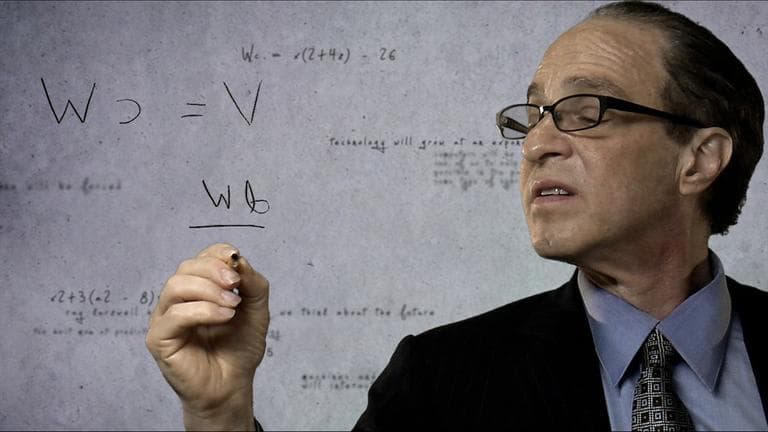Advertisement
Ray Kurzweil: Get Ready For A Computer In Your Brain
Resumehttp://www.youtube.com/watch?v=ntY01qoIdus
Tiny computers in our brains, artificial intelligence, maybe even eternal life. It's not science fiction, according to futurist Ray Kurzweil, it's the future.
A technology-guru and exceptional forward-thinker, Kurzweil made a name for himself as an inventor who's been able to unlock the secrets of our technological future. At 17, Kurzweil used a computer to compose music. He went on to MIT, invented the first CCD flat-bed scanner and has started more than 20 high-tech companies.
As for the future, Kurzweil predicts big things. Something as small as that smartphone in your pocket, which doubles as a computer, gives him the confidence to expect that the rapid pace of technological development won't abate.

"This computer, which is now already a billion times more powerful per dollar than what I used as a student, will be a billion times more powerful in 25 years and 100,000 times smaller," Kurzweil told Radio Boston's Anthony Brooks.
Kurzweil predicts that we'll be able to make computers as small as a blood cell in about 25 years. Obviously, that would have far-ranging effects.
"They'll go into our brains through the capillaries, interact with our biological neurons, put our brains on the Internet, give us vastly greater memory and problem-solving capability, keep us healthy from inside, augment our immune system," Kurzweil said.
At the center of Kurzweil's theories is the view that technological advances move not in a linear progression but in an exponential one. Thirty steps linearly, as Kurzweil says, gets you to 30. But 30 steps exponentially gets you to 1 billion. The difference between 30 and 1 billion often scares people, Kurzweil said, even though change is constant.
"What's really interesting is how startling changes become just routine, everyday reality once they happen," Kurzweil said. "I mean, I talked in the '80s about [how] there would be this vast worldwide network tying together hundreds of millions of people to each other and people thought that was nuts. When these things happen, we just accept them as everyday reality."
Anyone who has seen "Terminator," "Bladerunner," or any other science fiction piece knows that technology can be used for good and for evil. In Kurzweil's vision, tiny computers will help keep humans healthier and technology will yield the tools to cure poverty worldwide.
"The power of these technologies and its exponential rise is inexorable, how we apply it is not," Kurzweil said. "Are we really going to apply it to address poverty and disease and so on?"
Kurzweil has been both lauded as a visionary and derided as a crackpot. He's the focus of a new documentary, "Transcendent Man," that explores Kurzweil's theories and place in history.
No one can see the future — at least not yet. But many of his fans think Kurzweil is the closest we can get.
Guest:
- Ray Kurzweil, futurist
More:
- "Transcendent Man" at Coolidge Corner Theatre, March 21
This segment aired on March 21, 2011.